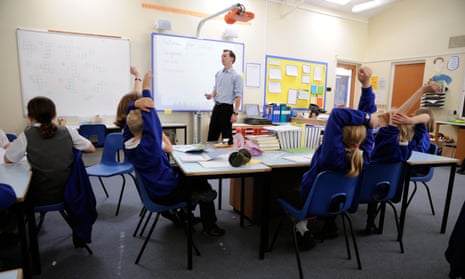England’s teacher shortage could worsen after the government rejected appeals by dozens of established providers to gain official accreditation for their initial teacher training courses.
Only 179 out of 240 existing courses have been accredited by the Department for Education (DfE) under its new standards for initial teacher training from 2024, and the DfE has now turned down all appeals from courses that missed out, including those run by the universities of Durham, Sussex and UWE Bristol.
The decision has left providers considering legal action against the DfE, and set off a scramble to form partnerships with accredited providers or be forced to close courses.
The Education Policy Institute (EPI), a thinktank, says about 68 courses failed to gain accreditation, putting 4,400 training places under threat – including 600 places for trainees in high demand subjects such as science, maths and technology.
The changes are part of an overhaul of teacher training provision in England, which forced all current providers to apply for accreditation and created a National Institute of Teaching that aims to gain degree-awarding powers.
But the Universities Council for the Education of Teachers (UCET) said the appeals process was “seriously flawed” and could lead to providers that have been supplying schools with excellent teachers for many years being forced to withdraw.
Emma Hollis, of the National Association of School-Based Teacher Trainers, said: “The implication is we are losing a significant number of high-quality providers. Incredibly, these include many who have been judged good or outstanding by Ofsted.
“We can only hope the expertise of committed, hardworking and experienced staff is not lost from the sector altogether.”
Last week it was revealed the DfE had missed its own targets for teacher recruitment this year, with overall numbers in training down by 20% to 29,000, compared with 36,000 trainees recruited last year. Recruitment for secondary school subjects was described as “catastrophic”, with only 59% of the government’s target being reached.
Rachel Hewitt, the chief executive of the MillionPlus group representing modern universities, called on the DfE to “pause and undertake a review of this process as a matter of urgency before the country loses much needed teacher education providers for good”.
Hewitt said she was concerned that many providers had lost their appeals despite strong track records.
“MillionPlus and others within the sector have repeatedly warned that failure to award accreditation to well-established, high-quality university providers … is a serious own goal for the government,” she said.
The EPI’s figures suggest that some regions will be more heavily affected, with the north-east and north-west of England at risk of losing about 1,000 training places, making it harder for local schools to recruit newly qualified teachers.
The courses rejected by the DfE included those run by the University of Cumbria’s institute of education.
Prof Julie Mennell, the university’s vice chancellor, said she was disappointed by the decision but hoped Cumbria would continue training teachers until it could win accreditation.
“We are in very positive discussions with a world-class education provider, and we look forward to sharing the focus and ambition of this proposed collaboration in the coming days and weeks,” Mennell said.
A spokesperson for the DfE said education was a top priority for the government, with an extra £2bn for schools for each of the next two years included in the autumn statement.
“Historically, the number of initial teacher training providers has not impacted the number of teachers recruited into our schools and our investment will enable school leaders to continue to invest in high quality teaching and tutoring for those who need it most,” the DfE said.
